Whoosh, with a short quick movement you pull leaves from the shaft when cleaning leeks. It's a few of seconds work, but time is money and labour is scarce. The trick is to pull off a minimum number of leaves without leaf tears from the leek when cleaning. The special properties of the Flexiton F1 variety make this possible. The leek variety was one of the labour-saving innovations during demo week 39 at BASF I Nunhems, BASF's vegetable seed business.
During a leek peeling competition, visitors could experience the special properties of Flexiton F1 for themselves. Being able to quickly clean leeks requires an easily removable leaf, without leaving a residue at the bottom of the shaft because the leaf does not break off properly.
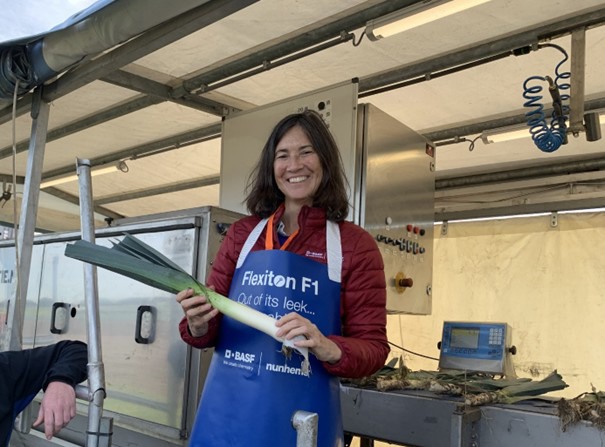
Silvia Cifre, VP Marketing and Sales, after a leek cleaning competition during the Demo Days media event.
"On average, people can clean around 400 leeks per hour," reckons Regional Crop Lead Bilgehan Suer on the importance of the variety innovation. "With Flexiton F1, it is possible to clean 100 more pieces per hour. Since 30 per cent of growers' costs go to labour, faster cleaning delivers significant savings here."
For BASF I Nunhems, leeks are a big crop, which, without exaggeration, they can be said to be the market leader in it. Four new varieties of leeks are in the pipeline, two of which will be launched at the end of 2023 and two in spring 2024. "With those new varieties, we want to give growers maximum flexibility and at the same time the possibility to produce leeks year-round," he says.
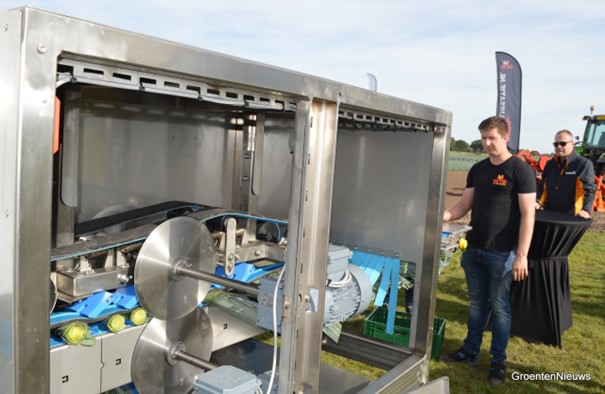
Mechanisation demonstrations, including for shortening leeks. In the Netherlands, leeks are sold by the piece, Belgium follows and piece sales are now also common in Germany.
Flexiton F1 is a variety with slightly slower growth, that way planting can be done a bit earlier and the planting work can be spread over several weeks. "The harvesting window of Flexiton is very long. This means growers always have fresh leeks available when there is demand from the market."
Choice in celeriac
During a tour of the celeriac demo field, Ann Demeulenaere put several varieties side by side. According to the product specialist, the market is "still growing a bit every year", partly thanks to popularity in meal kits.
Because it is a small crop, in terms of machine harvesting, that means no special machines are being developed for it either. "Growers use the existing machines for beet and potatoes to harvest," he says. Nevertheless, labour savings are possible thanks to variety innovations.
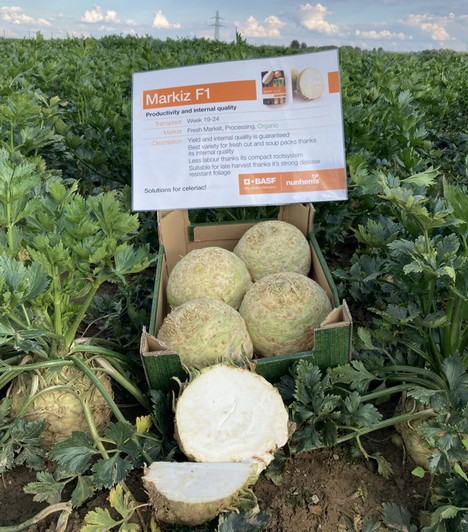
Markiz F1
Gains can also be made here on 'cleanability'. For that, it is useful if a tuber has less root formation, as is the case with the variety Markiz F1. It is a variety that has been on the market for 10 years and further stands out with 'full flesh'. Jargon for the lack of a small hole on the inside of the tuber.
Another variety in the demo field, Prinz F1, does have this hole. Celeriac is increasingly used in meal packages. "A fresh piece of tuber, without a cavity, is highly appreciated," says Ann. Ann points out that celeriac with a cavity sometimes raises questions. "There was once a consumer who sued the supermarket because pests in the supermarket had allegedly gnawed a piece out of the tuber."
As the storage season progresses, damage may occur to the head of the tuber during washing. Dukiz F1 is the newest variety in Nunhems' range, with a very strong head. Unlike Markiz F1, this variety does have slightly more roots.
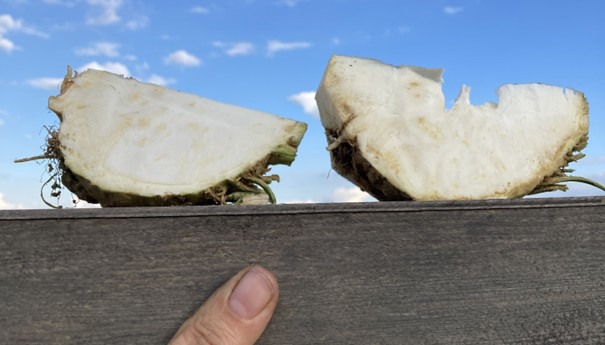
Storing carrots without refrigeration and storing carrots in the ground
The carrot demo field includes the development of carrot varieties for cold storage and soil storage. "The Netherlands is strong in cold storage," says Regional Crop Lead Bilgehan. Two years ago, BASF I Nunhems introduced the Florance F1 variety. "The advantage of Florance is its 'fresh clear' presentation after washing out of cold storage. So that means no grey layer, as you sometimes see."
Three new varieties are coming. Luc Serrée gives an update on the trials between pulling several demo varieties out of the ground. "In the Benelux, we are testing at 20 locations. With growers. Internationally, we are testing in more than 13 countries, always with at least 10 growers." One of these new varieties is the variety NUN 13119. "This variety needs one more year of testing," he says. It is being tested for long soil and cold storage.
A trend in the market is more storage in the ground, with straw in northern Europe, and without straw in southern Europe. Luc explains regarding the variety NUN 13123. "For the varieties bred specifically for this, even after washing, they remain fresh looking. It gives growers more flexibility."
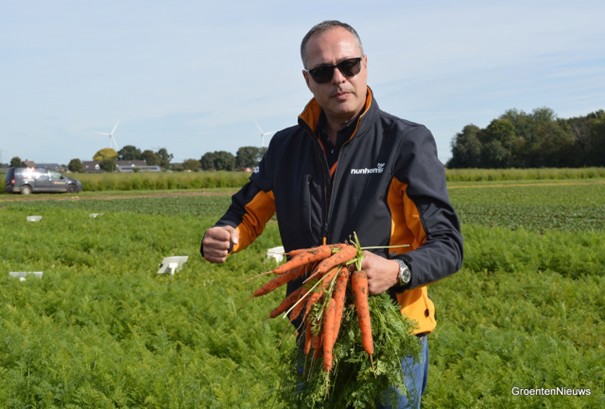
Regional Crop Lead Bilgehan Suer at the demo field with carrots.
For more information:
BASF I Nunhems 
[email protected]
www.nunhems.nl










